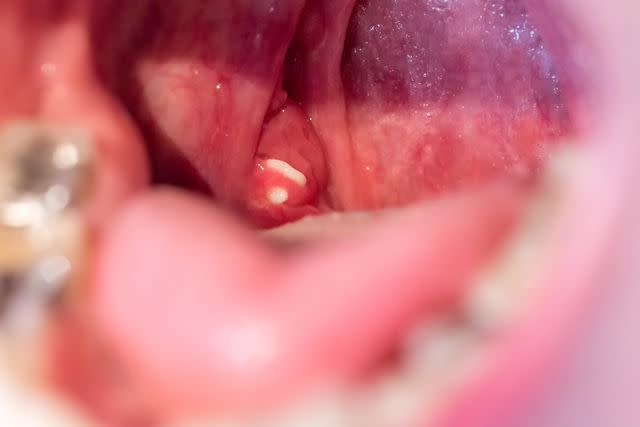What Are Tonsil Stones?

andreswd / Getty Images
Medically reviewed by Edmund Khoo, DDS
Tonsil stones are small, hard formations that can develop in your tonsils, which are the lymph nodes at the back of your throat. Tonsil stones are also called tonsilloliths.
Tonsil stones typically form from bacterial growth and cells. While the white or yellow stones don’t usually cause pain, they can smell quite unpleasant. Thankfully, you can manage the bad breath and the stone causing it.
Symptoms of Tonsil Stones
Tonsil stones can present with a variety of symptoms. The most common symptom of tonsil stones is bad breath (halitosis). Other symptoms include:
Cough
Earache
A sensation that something is stuck in your throat
Small white or yellow stones that you may spit up from your throat
Hard-to-treat throat infections
It’s also possible to not have any symptoms from your tonsil stones.
Editor’s Note: If you have bad breath, it is probably due to something else other than tonsil stones. It’s estimated that only around 3% of cases of bad breath are from tonsil stones.

Ralf Geithe / Getty Images
What Is Causing Your Tonsil Stones?
Your tonsils have pockets or folds within them known as crypts. Bacteria can grow in these crypts. Calcium can also go onto the cells within these crypts. The build up of the bacteria and cells in these crypts can turn into tonsil stones.
Bacteria and cells often build up due to inflammation in your tonsils, but that’s not always the case.
How Are Tonsil Stones Diagnosed?
Tonsil stones are typically diagnosed when a healthcare provider or dentist identifies them while examining your throat. The provider might find the stone during a visit you set up because you had symptoms. Or the provider might happen to find the stone during a routine visit—say a dental cleaning—even if you hadn’t been having any symptoms.
The provider may also identify the stones on an X-ray or other imaging scan you may have had for an unrelated reason.
A provider may find just one tonsil stone or multiple, and they can range in size.
Is It Bad to Have Tonsil Stones?
Tonsil stones won’t typically cause pain. And they aren’t usually harmful. But leaving them undiagnosed or untreated means that you can continue to experience any symptoms they might be causing, such as bad breath or discomfort.
Not addressing tonsil stones also runs the risk of allowing a smaller stone to grow larger.
How to Get Rid of Your Tonsil Stones
Tonsil stones often gradually break up on their own. This is especially true with regular, thorough gargling. To gargle with salt water, mix 1 teaspoon of salt into 8 ounces of water.
Depending on the stone’s size, you may be able to remove it yourself with a cotton swab. A healthcare provider may need to perform a minor extraction surgery to remove larger stones.
While rare, removal of your tonsils might be part of your tonsil stone treatment. The surgery is known as a tonsillectomy. The procedure might be considered if the stones are causing bad breath, clearing out the stones on your own is not working, and other breath-freshening methods are unsuccessful.
How to Prevent Tonsil Stones
Tonsil stones can best be prevented by maintaining good oral hygiene. This includes regular brushing—including brushing the front and back of the tongue—and flossing. You should also gargle with salt water after eating to clean out any debris.
If you’ve been taking preventative measures and have recurrent tonsil stones, a healthcare provider can help determine if you may need a procedure such as a tonsillectomy to prevent tonsil stones for good.
When to See A Healthcare Provider
If you suspect you have tonsil stones or you’ve received a diagnosis but are still experiencing symptoms after attempting to treat them, contact your healthcare provider. They can potentially help by providing further treatment or determining if you are dealing with a different condition.
A Quick Review
Tonsil stones are hard lumps within the folds and pockets of your tonsils. The white or yellow stones are made of built-up bacteria and cells. While tonsil stones are not typically painful or harmful, they can cause symptoms like bad breath, sore throat, or a feeling as though something is in your throat. If you suspect you have tonsil stones, bring it up with a healthcare provider like a dentist to get a proper diagnosis and treatment plan. Tonsil stones usually come out on their own. But you can also get them to come out by gargling or by having a healthcare provider take them out. Rarely, tonsil stone treatment includes removal of the tonsils. You can prevent tonsil stones by maintaining good oral hygiene.
For more Health news, make sure to sign up for our newsletter!
Read the original article on Health.

